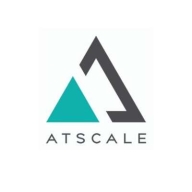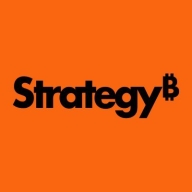

Find out what your peers are saying about Microsoft, Salesforce, Domo and others in BI (Business Intelligence) Tools.
| Product | Market Share (%) |
|---|---|
| MicroStrategy | 1.3% |
| AtScale Adaptive Analytics (A3) | 0.4% |
| Other | 98.3% |
| Company Size | Count |
|---|---|
| Small Business | 37 |
| Midsize Enterprise | 26 |
| Large Enterprise | 100 |
AtScale is the leading provider of intelligent data virtualization for big data analytical workloads, empowering citizen data scientists to accelerate and scale their business’ data analytics and science capabilities and ultimately build insight-driven
AtScale connects people to live disparate data without the need to move or extract it, leveraging existing investments in big data platforms, applications and tools. AtScale creates automated data engineering using a single set of semantics so consumers can query live data (either on premise or in the cloud) in seconds without having to understand how or where it is stored—providing security, governance and predictability in data usage and storage costs.
Benefits:
No data movement: AtScale is agnostic to data platforms and data location, whether on-premises or in the cloud, in a data lake or a data warehouse.
Automatic “smart” aggregate creation: AtSacle’s intelligent aggregates adapt to the data model and how it is used, automating the data engineering tasks required to support those activities and reducing time spent from weeks to hours.
Use your existing BI and AI tools: AtScale provides access to live, atomic-level data without the user needing to understand where or how to access the data, so you can keep using your tools of choice.
No more extracts or shadow IT: AtScale eliminates the need for extracts with a single, consistent, governed view of live data, regardless of which BI and AI tools are used.
Data-as-a-service: AtScale allows metadata to be created once, with centrally defined business rules and calculations, exposing data assets as a service.
Data platform portability: Models built in AtScale are portable, with no need to recreate them for different platforms. AtScale can easily be repointed to new data platforms, making migration seamless to business users.
Faster time-to-insight: AtScale reduces time-to-insight from weeks and months to minutes and hours. AtScale virtual models can be created and deployed in no time, with no ETL or data engineering.
Future-proof your data architecture: AtScale alleviates the complexities of data platform and analytics tool integration, making cloud, hybrid-cloud and multi-cloud data architectures a reality without compromising performance, security, agility or existing governance and security policies.
Features:
Design CanvasTM: AtScale’s Design Canvas visually and intuitively connects to any data platform, allowing you to create virtual multidimensional cubes without ETL.
Autonomous Data Engineering: Just-in-time query optimization that anticipates the needs of the data consumer.
Universal Semantic LayerTM: A workspace with a Design Canvas for your data consumers to define business meaning and get a single-source-of-truth.
Security & Data Governance: Centralized security policy to decentralize access using the tenants of Zero Trust.
Virtual Cube Catalog: A gateway to data that is easily discoverable and frictionless—and available to use every day, en masse.
AtScale connects people to live disparate data without the need to move or extract it, leveraging existing investments in big data platforms, applications and tools. AtScale creates automated data engineering using a single set of semantics so consumers can query live data (either on premise or in the cloud) in seconds without having to understand how or where it is stored—providing security, governance and predictability in data usage and storage costs.
Company: Founded in 1989, MicroStrategy (Nasdaq: MSTR) is a leading worldwide provider of enterprise software platforms. With direct operations in 26 countries worldwide and approximately 2,000 employees, our mission is to provide enterprise analytics, mobility, and security platforms that are flexible, powerful, scalable and user-friendly. To learn more, visit MicroStrategy online, and follow us on Facebook and Twitter.
Product portfoilio:
MicroStrategy 10 Secure Enterprise™ empowers leading organizations to analyze vast amounts of data and distribute actionable business insight throughout an enterprise through two distinct offerings: MicroStrategy Analytics™ and MicroStrategy Desktop™. MicroStrategy Analytics delivers reports and dashboards, and enables users to conduct ad hoc analysis and share insights anywhere, anytime, via mobile devices or the Web. It also combines the agility and productivity of self-service visual data discovery with the security, scalability, and governance features of enterprise-grade business intelligence. MicroStrategy Desktop is a standalone, on-premise visual data discovery tool designed to enable business users to analyze and understand their data. MicroStrategy Mobile™ enables organizations to rapidly build custom business applications that deliver analytics combined with transactions, multimedia, and custom workflows to mobile devices. MicroStrategy Secure Cloud™ combines all of the enterprise analytics, mobile, and security features in MicroStrategy 10 Secure Enterprise with powerful and scalable data integration, validation, and warehousing services — all delivered in an environment where organizations can deploy transformational analytics applications in minutes.
Usher, MicroStrategy’s breakthrough security solution, is a powerful mobile security platform designed to dematerialize traditional forms of identity verification (such as passwords, tokens, and physical badges) and replace them with a single mobile identity badge that is cryptographically linked to its owner’s smartphone and dynamically linked to an enterprise’s existing identity repositories. Usher works on standard Android and iOS smartphones, and also boasts an Apple Watch™ integration.
We monitor all BI (Business Intelligence) Tools reviews to prevent fraudulent reviews and keep review quality high. We do not post reviews by company employees or direct competitors. We validate each review for authenticity via cross-reference with LinkedIn, and personal follow-up with the reviewer when necessary.